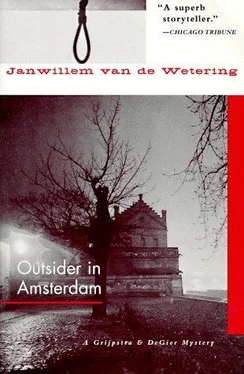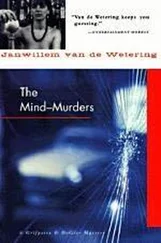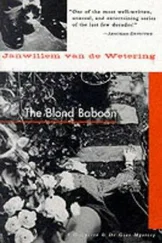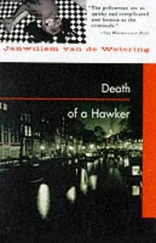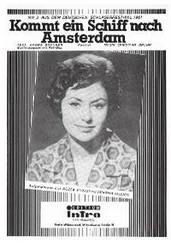Janwillem De Wetering - Outsider in Amsterdam
Здесь есть возможность читать онлайн «Janwillem De Wetering - Outsider in Amsterdam» весь текст электронной книги совершенно бесплатно (целиком полную версию без сокращений). В некоторых случаях можно слушать аудио, скачать через торрент в формате fb2 и присутствует краткое содержание. Жанр: Полицейский детектив, на английском языке. Описание произведения, (предисловие) а так же отзывы посетителей доступны на портале библиотеки ЛибКат.
- Название:Outsider in Amsterdam
- Автор:
- Жанр:
- Год:неизвестен
- ISBN:нет данных
- Рейтинг книги:4 / 5. Голосов: 1
-
Избранное:Добавить в избранное
- Отзывы:
-
Ваша оценка:
- 80
- 1
- 2
- 3
- 4
- 5
Outsider in Amsterdam: краткое содержание, описание и аннотация
Предлагаем к чтению аннотацию, описание, краткое содержание или предисловие (зависит от того, что написал сам автор книги «Outsider in Amsterdam»). Если вы не нашли необходимую информацию о книге — напишите в комментариях, мы постараемся отыскать её.
Outsider in Amsterdam — читать онлайн бесплатно полную книгу (весь текст) целиком
Ниже представлен текст книги, разбитый по страницам. Система сохранения места последней прочитанной страницы, позволяет с удобством читать онлайн бесплатно книгу «Outsider in Amsterdam», без необходимости каждый раз заново искать на чём Вы остановились. Поставьте закладку, и сможете в любой момент перейти на страницу, на которой закончили чтение.
Интервал:
Закладка:
"Police," Grijpstra said. The tall thin man behind the counter looked resigned. A small child came from the back of the shop and looked at the policemen.
"Hello," de Gier said but the child didn't reply. A woman came down the stairs.
"I told you it would happen," the woman said. "It had to happen one day."
"Shut up," the man said. There was no anger in his voice.
"You," de Grier said to Koopman, "come with me."
"Can I go?" Koopman asked when they were back in the alley.
"Sure. Here is my card. Don't change your address without letting us know."
"This isn't my day," Koopman said. "Some people came to tell me last night that I have to shift my boat to another canal. If I don't it will sink within three days. They didn't like that business with the dead girl. And now this."
"Too bad," de Gier said and walked back to the shop.
"Why do you sell drugs?" Grijpstra asked.
"Why?" the man asked. "Why do you think? I'll give you three guesses. Because I like it? Wrong. Because I want to be arrested by the police? Wrong again. Because I want to make a little money to keep my family? Right."
"Can't you work?" Grijpstra asked.
"No," the woman answered, "he's been in a mental home. He can't get a job."
"Doesn't the state pay?"
"Sure," the woman said, "and I wanted to go out and do some work as well but he wants me to be here."
"Grovel about on your knees and mop floors," the man said.
"What's wrong with being a charwoman?" the woman asked. "I'd rather mop floors than have you in jail."
"We'll have to search the place," Grijpstra said. "You better give me what you have."
The man gave him a little tin containing a dozen little plastic bags filled with white powder.
"Any more?"
"No."
"Where did you get it?"
The man shook his head.
"Tell him," the woman said. "I am not afraid."
But the man was and they had to spend a little time on him. The woman helped. Finally the man gave in. He bought his supplies in a little bar in the red-light district.
"We'll have to take your husband with us," de Gier said to the woman.
"Be easy with him," the woman said. "His mind isn't right."
"We'll see what we can do," Grijpstra said.
That evening the bar was raided. It was raided very professionally and some drugs were found but there were no arrests. The drugs were in a dustbin in a small courtyard but nobody knew how they got there.
All week the police force worked. Detectives looking like hippies raided the sleep-ins and parks. The bars were combed. People were arrested in tram shelters and under bridges. The stations were full of suspects and the city's detectives worked overtime night after night. The uniformed police helped and the state police helped, even the military police followed up tracks and caught a few dealers in the armed forces. The net was dragged through several provinces and some echoes were heard in Germany and Belgium. Suspects were charged and taken into custody but no connection with either Beuzekom and Company or the Hindist Society was found.
"I've had it," de Gier said and climbed on a barstool in a small cafe. Grijpstra had been waiting for him.
"A beer, sergeant?" the barman asked in a loud voice.
"Please," de Gier said, "and keep your voice down. You've been working here long?"
"All right," the barman said, "calm down. I didn't mean any harm."
"Go and serve the other customers, mate," Grijpstra said. "Any luck?"
"Nothing," de Gier said. "Sure, I caught someone, very small fry. The charge will stick, I imagine. But not what we are looking for."
"We won't find what we are looking for," Grijpstra said, "not this way."
De Gier looked at Grijpstra over the rim of his glass.
"No? Why not?"
"The man we are looking for isn't known. He is probably new to the game, to this game I mean. He'll be a criminal but he won't have a record. He is a big fellow, quite detached from the known contacts. He has offered, or sold a bulk lot of drugs. My guess is that Piet Verboom was the only man who knew who our man was."
"So why didn't you tell the chief inspector?" de Gier asked.
Grijpstra smiled.
"Why should I? I would have spoiled his game. He was looking for an excuse to shake up the underworld. And he certainly has. The action hasn't been a flop you know, a lot of people have been caught, people we were looking for."
"We, the police, you mean," de Gier said, "not you and me."
"Not you and me," Grijpstra said, "but who are we?"
De Gier drank his beer and smacked his lips, holding up the glass. The barman filled it for him.
"You are very quiet all of a sudden," de Gier said.
"Lost my tongue," the barman said and smiled. De Gier smiled back.
"Pity Verboom was such a secretive little bastard," Grijpstra said. "He never told anyone anything. His own wife didn't really know what he was up to. His girlfriend didn't. The boys working in the Society didn't."
"And we don't either," said de Gier.
"It's all over," said the chief inspector.
"Yes sir, Grijpstra said.
"Well, it can't be helped. Your case is still stuck. You can go back on normal duty for the time being. I'll keep on working on the case from here and I'll let you know if something happens."
"Yes, sir," de Gier said. "Did you learn anything about Joachim de Kater, the accountant?"
"Yes," the chief inspector said, "quite a bit. I'll tell you."
The detectives relaxed and the chief inspector began to pace the floor, hesitating every time he passed his cactus.
"De Kater was a brilliant student," he said, "finished his studies just before the war. He couldn't get a job during the war but he went into business for himself, manufacturing talcum powder for the German army and mixing a little grit with it so that the soldiers would have bleeding feet. A true patriot. He was arrested but released again, probably bribed the German police. He worked for several well-known firms after the war but left them and went into partnership with an old colleague who died. So far everything is fine. But we investigated his present business a little and he doesn't seem to be working much. He has a few clients who pay him some fifty thousand a year, all added. That isn't much for a registered accountant. Usually they get at least four times as much. And he has an expensive office and lives in style, paying a fat alimony to his former wife. He doesn't have a girlfriend but he visits elegant sexclubs. We tried to work out what he spends and it's at least twice as much as he should be spending."
"May not be declaring his full income," Grijpstra said.
"Of course," the chief inspector said, "nobody does declare his true income anymore, except us officials and the poor blokes who work for others. It has gone out of fashion."
"So I expect you informed the tax inspector," de Gier said smiling.
"I did," the chief inspector said, "but they were already aware of his existence. They can't prove anything, however. They are watching him, that's all."
"Where did he get the money to pay for the two houses of Piet Verboom?" Grijpstra asked.
"Yes," the chief inspector asked, "that's exactly what I asked him when I invited him to come and see me. He says it was given to him and he won't tell me who gave it. A professional secret he said. Some investment company wanting to buy a lot of houses in the Haarlemmer Houttuinen. To build a hotel, I imagine."
The detectives looked at the chief inspector.
"It could be," the chief inspector said.
"Perhaps you would like to look into this," the chief inspector said.
Within an hour the detectives were on the road again, on their way to visit a wholesale company dealing in electrical goods. Its owner suspected one of his directors of embezzlement.
Читать дальшеИнтервал:
Закладка:
Похожие книги на «Outsider in Amsterdam»
Представляем Вашему вниманию похожие книги на «Outsider in Amsterdam» списком для выбора. Мы отобрали схожую по названию и смыслу литературу в надежде предоставить читателям больше вариантов отыскать новые, интересные, ещё непрочитанные произведения.
Обсуждение, отзывы о книге «Outsider in Amsterdam» и просто собственные мнения читателей. Оставьте ваши комментарии, напишите, что Вы думаете о произведении, его смысле или главных героях. Укажите что конкретно понравилось, а что нет, и почему Вы так считаете.
